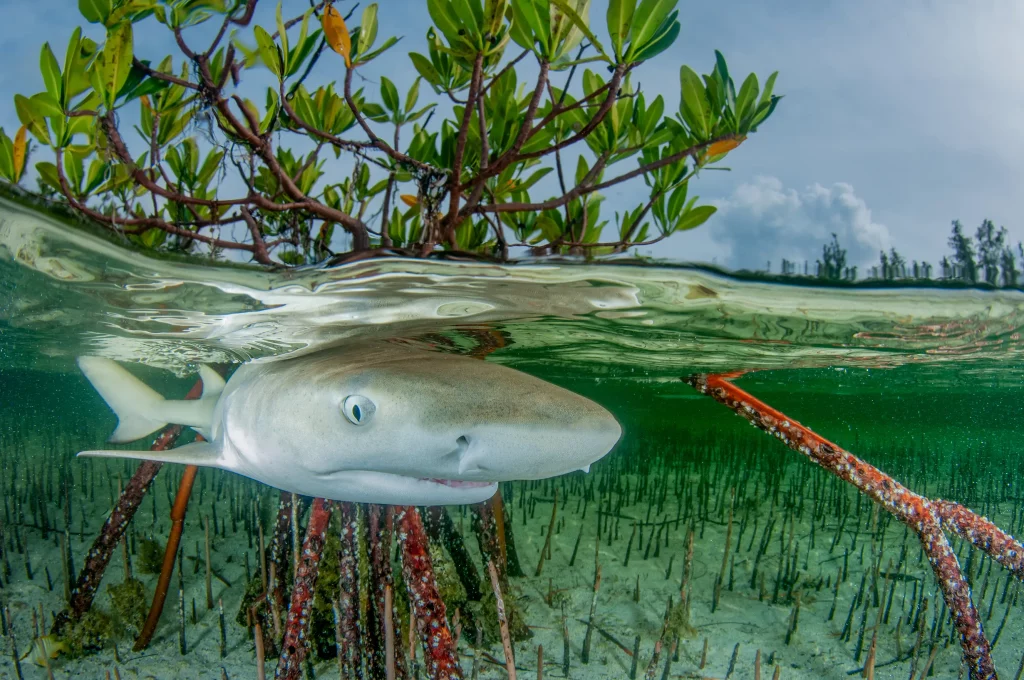Did you know lemon sharks are often called the “golden retriever of sharks”? This statement is well grounded, as lemon sharks are considered some of the friendliest known sharks.

Behavioral Traits of Lemon Sharks
Suppose you’re doubting whether lemon sharks are aggressive. In that case, you need only look at the many videos online showcasing their friendly nature (a great example of a diver befriending a lemon shark is in the video below). From lemon sharks recognizing and swimming up to familiar divers to lemon sharks pushing other sharks away to be the center of attention, many behaviors suggest that lemon sharks aren’t aggressive at all.
Comparisons with Other Sharks
Lemon sharks are often compared to golden retrievers due to their friendly and social behavior, while bull sharks are compared to pit bulls due to the bad reputation surrounding them despite them being just as friendly.
Tiger sharks are best known for their bold and curious nature, which can be seen when they swim right up to divers despite never meeting the latter.
Sandbar sharks are often compared to squirrels due to their habit of quickly shifting their attention from one thing to another.
Human and Lemon Shark Interactions
Human and lemon shark interactions have existed since at least 300 BC, with lemon sharks recorded being caught and sold in markets.
While these interactions have proved detrimental to the sharks, rarely is it the other way around. According to the International Shark Attack File, there’ve only been 10 recorded unprovoked lemon shark attacks, none of which were fatal. While this can’t prove that the sharks like humans, this certainly supports the idea that lemon sharks are friendly and not aggressive.
The Lemon Shark’s Reputation
Although first impressions of lemon sharks are often negative due to their size, speed, and strength, they’re much more complicated animals than one might think. Not only are they one of the most social shark species (they enjoy being in groups with others of similar size), but they also seldom attack humans and are in fact, much more curious than anything. Their curiosity and non-aggressive behavior sometimes lead lemon sharks to develop close relationships with local divers, contributing to their “nice” reputation.
Conservation Status of Lemon Sharks
Lemon shark population decline is becoming of increasing concern due to overfishing (mainly for their meat and fins), being caught as bycatch, and the loss of their natural habitats (i.e. mangrove forests).
As a result, although exact population numbers aren’t available, lemon shark populations are estimated to have decreased by roughly 50-79% globally over the last 50 years. Because of this, the IUCN Red List currently lists lemon sharks as near threatened.

Understanding Lemon Shark Behavior
There are several reasons why lemon sharks are less likely to be a danger to humans, most of which have to do with their behavior.
They are Social Animals
As mentioned earlier, lemon sharks prefer congregating with individuals of similar size. This means they have become much more accustomed to being around others, unlike sharks who prefer a solitary lifestyle. This sense of comfort could extend beyond sharks to humans.
They’re Often Around People
Because they mostly live in shallow waters, lemon sharks come into frequent contact with people. This might cause them to develop a sense of familiarity and thus, comfort when being around people.
Interesting Facts About Lemon Sharks
Despite these interesting facts about lemon sharks, remember to keep in mind that there’s never been a single fatal attack by a lemon shark, thus demonstrating the non-aggressive nature of this species.
- Lemon sharks are among the larger shark species, with lengths averaging from 8 to 10 feet (2.4 to 3 m), with the record holder being roughly 12.1 feet (3.7 m) long!
- Lemon sharks can weigh up to 550 lbs (250kg) and live up to 30 years
- Lemon sharks are so called because of their yellow-brown skin, which allows them to effectively camouflage within the sandy, tropical waters that they inhabit
- Lemon sharks are found at depths above 300 feet (90 m).
The Ecosystem Role of Lemon Sharks
Lemon sharks feed on prey such as various bony fish, rays, crustaceans, seabirds, and other sharks. Lemon sharks have no true predator, meaning that the only real threat they face is the occasional predation of small lemon sharks by their larger relatives.
Because they have no natural predators, lemon sharks are considered apex predators. Since they sit at the top of the food chain, they help regulate all other species below them, thus helping maintain stability within the ecosystem.
Lemon sharks also provide refuge for other shark species due to the former’s presence. They also improve the biodiversity of coral reefs by providing habitats for other smaller species in the ecosystem as they prevent overpopulation.
FAQs About Lemon Sharks
Do Lemon Sharks Like to be Pet?
Lemon sharks enjoy being pet once they’ve gotten to know you. It may take a while for them to trust and get to know you, but once they do, they might swim right up to you for a pet, or even bump other sharks away out of jealousy!
Are Lemon Sharks Tame?
While lemon sharks are not considered aggressive, they shouldn’t be thought of as tame because they are, at the end of the day, wild and not domesticated animals. You should always respect their space and privacy before attempting to interact with them.
What is the Personality of a Lemon Shark?
Lemon sharks are described as social, intelligent, and curious animals. They’ll often swim up to humans and interact with them gently and kindly, making them “friendly” as well.
Conclusion
Although lemon sharks can certainly be thought of as friendly animals that are extremely unlikely to harm humans, they are nonetheless wild animals. If this article has (hopefully) piqued your interest, you can consider joining a diving excursion to get the chance to safely meet some of these incredibly fascinating animals.